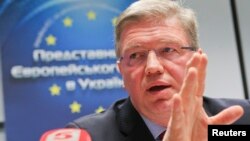ANKARA —
Turkey must restore lost independence to its judiciary if its ambition to join the European Union is to stay on track, a top EU official said on Tuesday, criticizing the hasty adoption of new laws and judicial purges following a government graft scandal.
EU enlargement commissioner Stefan Fule said Turkey's response to the corruption affair, reassigning judges and investigators and introducing new laws without EU consultation, had moved the country further away from European norms.
“Over the past months there have been doubts cast over Turkey's commitment to European values and standards,” Fule said in a statement after meetings with civil society representatives and government ministers in Ankara.
But Fule leapt to the defense of Turkey's constitutional court, which has repeatedly been criticized by Prime Minister Tayyip Erdogan, championing its cancellation of bans on social media sites YouTube and Twitter and its amendments to controversial legislation which gave government more control of the judiciary.
“These actions of the constitutional court contribute to what is now really needed: to bring confidence back to the judiciary,” he said.
Erdogan's AK Party reassigned hundreds of judges and prosecutors and imposed temporary bans on YouTube and Twitter as the corruption scandal, which erupted in December, swirled around his inner circle earlier this year.
Erdogan
Voice recordings and documents presented as evidence of wrongdoing were posted by anonymous users on the social media sites in what Erdogan cast as a plot by agents of a parallel state led by ally-turned-foe Fethullah Gulen, an Islamic preacher with influence in the police and judiciary.
The scandal and Erdogan's sweeping response appears to have done nothing to undermine his position as by far Turkey's most popular politician. His AK Party swept recent municipal polls and he looks well set, if he chooses to stand, to win election to a presidency endowed with stronger powers in August.
Turkey has said it remains determined to continue on the path towards EU accession, which can bring benefits of easy access to the world's biggest trading bloc, funding for poorer regions and membership of a relatively politically stable body.
But government officials have voiced frustration at what they see as unnecessary bureaucratic and political obstacles.
In November, Turkey and the EU opened a new negotiating chapter after EU member states had delayed the move in protest over a Turkish crackdown on anti-government demonstrations.
The delay followed a series of political disputes, notably over the divided island of Cyprus, and resistance in Germany and France, which have slowed progress. It has also undermined some public support for membership among Turks.
EU enlargement commissioner Stefan Fule said Turkey's response to the corruption affair, reassigning judges and investigators and introducing new laws without EU consultation, had moved the country further away from European norms.
“Over the past months there have been doubts cast over Turkey's commitment to European values and standards,” Fule said in a statement after meetings with civil society representatives and government ministers in Ankara.
But Fule leapt to the defense of Turkey's constitutional court, which has repeatedly been criticized by Prime Minister Tayyip Erdogan, championing its cancellation of bans on social media sites YouTube and Twitter and its amendments to controversial legislation which gave government more control of the judiciary.
“These actions of the constitutional court contribute to what is now really needed: to bring confidence back to the judiciary,” he said.
Erdogan's AK Party reassigned hundreds of judges and prosecutors and imposed temporary bans on YouTube and Twitter as the corruption scandal, which erupted in December, swirled around his inner circle earlier this year.
Erdogan
Voice recordings and documents presented as evidence of wrongdoing were posted by anonymous users on the social media sites in what Erdogan cast as a plot by agents of a parallel state led by ally-turned-foe Fethullah Gulen, an Islamic preacher with influence in the police and judiciary.
The scandal and Erdogan's sweeping response appears to have done nothing to undermine his position as by far Turkey's most popular politician. His AK Party swept recent municipal polls and he looks well set, if he chooses to stand, to win election to a presidency endowed with stronger powers in August.
Turkey has said it remains determined to continue on the path towards EU accession, which can bring benefits of easy access to the world's biggest trading bloc, funding for poorer regions and membership of a relatively politically stable body.
But government officials have voiced frustration at what they see as unnecessary bureaucratic and political obstacles.
In November, Turkey and the EU opened a new negotiating chapter after EU member states had delayed the move in protest over a Turkish crackdown on anti-government demonstrations.
The delay followed a series of political disputes, notably over the divided island of Cyprus, and resistance in Germany and France, which have slowed progress. It has also undermined some public support for membership among Turks.








